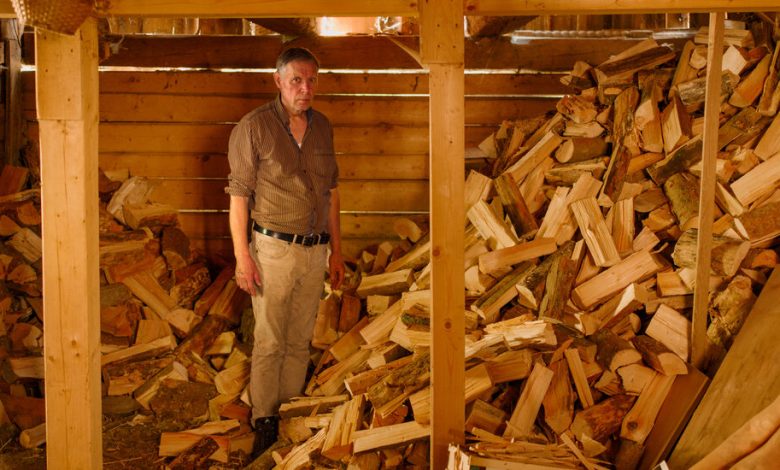Germany’s Energy Crisis Is a Cue to Chop Wood and Stock Up

Tightly stacked cords of wood line the side of a couple’s home in southern Germany, while another family farther north has lined their basement with shelves stacked with pasta, rice, cooking oil and cans of chickpeas, lentils and tomatoes.
In central Germany, a man long wary of relying on the government has ensured that he can make it through weeks without power or heat; he’s filled his attic with coolers to hold food, along with a camping stove, gas canisters and solar power equipment to keep the lights on and stay connected online. Others brave the chilly waters of a local lake for a daily dip, forgoing a hot shower at home.
Across Europe’s largest economy, people are stocking up and battening down. Even as the authorities publish lists of essential items to prepare for power outages or natural gas rationing, many Germans are taking matters into their own hands to ensure that they have a warm home and food on the table through the winter.
A majority of Germans, a full 60 percent, trust their government, according to the Organization for Economic Cooperation and Development. But with a seemingly endless barrage of Russian-fired missiles falling on Ukraine, helping to send prices for energy and food at home soaring, many Germans have decided that if faced with the worst, they might be on their own. They want to be prepared.
The Woodsman

Mr. Bäumler splits logs into firewood for the stove that he uses to heat his home.
Leo Bäumler spends his afternoons splitting logs from trees that he fells in a forest that is owned by his sister, near his home near Weiden, in the southern state of Bavaria. He stacks them in his woodshed until he feeds them into the stove in the kitchen of the low-slung house where he grew up.
While thousands of people across Germany have reopened sealed-off fireplaces and installed wood-burning stoves to avoid burning natural gas, which doubled in price over the past year, Mr. Bäumler heats his rooms, boils water for his morning coffee and bakes pizza with his wood-burning stove as ever.
Years ago, he recalls, his father refused to install a gas-fired central heating system, back when the first pipelines reached his home region, connecting Siberian gas fields with then-West Germany, across the Iron Curtain. For decades, natural gas piped in from Russia was abundant and cheap. Half the homes in Germany use gas for their heating.
Even before the Russian army invaded Ukraine in February, flows of Russian gas had started to dwindle, causing the wholesale price to more than double. But German leaders, citing the reliable deliveries since the Soviet era, refused to believe that President Vladimir V. Putin would deprive Europe of gas in retaliation for the European Union’s support for Ukraine. Many Germans, though, whose bills were already beginning to soar at the end of 2021, began to prepare.
By the time Russia had made their first cut to gas deliveries in late spring, the government began floating the idea that Germans might have to face rationing come winter. That sent many people to heating supply stores to purchase wood stoves, and since then the price of cords of wood and wood pellets has jumped.by more than 87 percent compared with 2021.
But Mr. Bäumler hasn’t noticed.
“Since I live in the middle of the forest in eastern Bavaria, surrounded by trees,” he said, “I don’t have to worry that I will run out of wood.”
The Ice Bather
While some Germans are readying for an eventual blackout or gas stoppage, still others are focusing on ways to conserve energy. The country’s economy minister, Robert Habeck, became the butt of jokes over the summer when he encouraged Germans to take shorter, cooler showers.
Gregor Ranz and his friends didn’t need the encouragement. Every morning between 8 and 9, they meet to skinny dip into a lake in the Wedemark district, north of Hanover. They have been holding their morning ritual since well before the energy crisis — even when the temperatures dip below freezing.
Although the gathering is social as well, Mr. Ranz said that once the energy crisis set in, it made more sense. Bathing nude — common in much of Germany — each morning served as effectively taking the cold shower approach to the extreme.
“I shower once a week, when I go to the sauna,” he said. “Of course I have a shower at home, but I don’t use it. A washcloth works just fine.”
Making Connections
Bernd Sebastian has relied on a 25-year-old gas furnace to power the boiler that provides warm water and heating for his home. When the price of gas began to rise, he upgraded his furnace, but he also hooked up his wood-burning stove to heat the water in his main boiler.
“We sit in front of our fireplace every day, and it warms the water in my boiler and the heater draws from that,” he said. When the fireplace is off, the gas furnace kicks in.
He said that he contemplated getting a heat pump, which draws warmth from the air. “That would be ideal, but that runs on electricity and with power prices going up, it wouldn’t save me money unless I installed solar panels, which is another outlay.”
Mr. Sebastian gathers wood from a nearby forest that is managed by a friend who alerts him when trees have fallen or been felled. Then he gathers it up and brings it home to be split and stacked.
Since last year, he has been stocking up, stacking it in every patch he can find in and around his home, including some outdoor space used by his wife, Roswitha. At 76, he’s worried that he might not be able to keep enough of it chopped and ready to keep their fireplace going and avoid using gas.
“I’ve had to steal two flower beds from my wife,” he said. “And the third is up for discussion.”
Leaving the Grid
Bernward Schepers did not wait for the government to begin urging citizens to stock up on nonperishable food and 20 liters of water per person. For months, he has been collecting supplies and pivoting his heating and power away from fossil fuels.
“Thank God I bought a wood-burning stove years ago,” he said. Over the past year, he has acquired an electric heater and a large battery with portable solar panels that can be folded out to generate energy.
More and more Germans were drawn to solar energy in 2022. The amount of power generated from solar panels increased by one-third in the first part of the year, amid fears of potential blackouts.
“If we were to lose electricity, that way at least we can power some of the small things and keep the food in the refrigerator from spoiling,” he said. “I also bought a small stove with a gas canister, so that if needed we can cook.”
When he first talked of readying for the worst, Mr. Schepers’ son, Bastian Schepers, rolled his eyes. For a while, his family poked fun at his preparations. Not anymore.
He also has been sharing his knowledge with colleagues and friends, who have approached him for advice.
“You just have to make sure that you always have your food stocks up to scratch, that you have enough there,” Mr. Schepers said. “Then you are good, whatever happens.”
The Stockpilers
It was the first Covid lockdowns that sent the Arndt family into preparation mode. “It started with toilet paper,” said Lars Arndt, who lives at home with his parents, brother and grandfather in Johannesberg, southeast of Frankfurt.
That was when his mother, Claudia Arndt, decided they needed to turn their basement, where the family had stored a variety of things, including some nonperishable items like jam and tinned vegetables, into a storage unit. As the lockdowns in Germany progressed in 2020 and 2021, the family began stockpiling more items, adding flour, pasta and a tank holding 100 liters of drinking water.
They also changed the way they heat the house. After years of relying on a gas-fired furnace for central heating, this winter they reverted to their main wood-burning stove which only heats the dining and living rooms on the main floor of the house. The other rooms are unheated.
“We have been thinking more and more,” he said, about “what we can do to make sure that we are able to provide for ourselves.”
“We don’t want to be dependent on others for what we need,” he added. “But to be able to take things into our own hands.”




